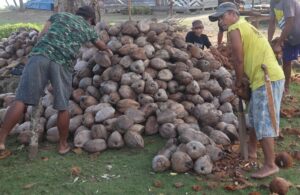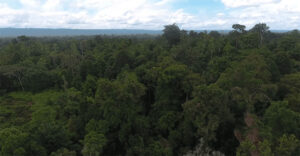
Kaimana is located at the neck of Papua Island bird-shape. Natural richness of Kaimana Regency, West Papua, here might be comparable to that of in the notable Raja Ampat. Most people in Kaimana reside in coastal areas. Kaimana has many natural beaches that could be tourism destination. One of the prominences in Kaimana is Triton Bay. The beauty in Triton Bay is equivalent to enchantment of Raja Ampat. Triton Bay has coral islets and thick vegetations.
“We have remarkable natural resources. For the people of Kaimana, sea is their mother who provides milk and honey. Local people, therefore, are completely aware of the importance of environmental protection,” said Matias Mairuma, the Head of Kaimana Regency, in the EcoNusa Outlook 2020 event on January 28, 2020, in Jakarta.
More than 150 participants attended the EcoNusa Outlook 2020 here. They were from government officials, academic society, media, bloggers, partners and communities. Among the attendants are Matias Maimura, the Head of Kaimana Regency, West Papua, Jimmy Wanma, a researcher from Papua University, Felia Salim, a member of EcoNusa Foundation Board of Trustee. Yuli Fonatabe, Miss Indonesia Papua 2018 and Liputan6 News Anchor, was the moderator of the event.
However, the beauty, uniqueness and all potentials of natural resources and community local wisdom in Kaimana will be gone amidst the looming threat of investment on behalf of development in the Land of Papua. Kaimana stretches over around 15,242 kilometer squares with more or less 68,000 populations.
“It’d be better for us to prepare the community prior to advancement of all potentials in Kaimana,” asserted Regent Matias adding the importance of local community development.
Despite his position as the government official, his concern with environmental issues forces him to criticize the current development policy which tends to be good on the table. But, on the other hand, the policy still fails to notice the community participation. As a result, the government development policy every so often can hardly be well-implemented on the ground.
According to Matias, all communities in Kaimana and the Land of Papua are in want of improvement. But they need road access to transport their local product to reach market. Accessibility poses the challenge that need prompt solution in Kaimana.
In addition to accessibility, another challenge comes from disparity or pricing gap of local products from the local farmers and the prices of industry chain. One of the examples, Matias said about the local crab, locally called karaka. “From the local people, a crab costs IDR2,000. When it reaches the town, people eat karaka should pay up to IDR100,000. The price hike gap from local people and outsider takes advantage of it. This is my deep concern,” said Matias.
People in Kaimana commonly get benefits from mangrove for the karaka or fish as their livelihood. They are aware that they should preserve mangrove and forest to survive their lives. “But, the importance of environment and its protection are simply not enough. There is overarching economic potential to which the community deserve in sustainable way,” said Matias highlighting the importance of accessibility and disparity of local product pricing.
Kaimana is one of the 9 regencies/mayoralties in West Papua in which EcoNusa works in collaboration with all stakeholders for the Land of Papua development. Kaimana has prominent potential of mangrove along the coast lines in the regency. Primary mangrove in Kaimana is 42,951 hectares and the secondary mangrove 13,667 hectares.
“One day, mangrove will be gone. But under my authority as the regency head, I will say ‘No’ to it. We should protect all of them,” Matias asserted underlining the significance of local people understanding on mangrove protection while earning the economic benefit without spoiling them.
Responding to this issue, Bustar Maitar, the CEO and founder of EcoNusa, said that the indigenous people has been aware that nature is their future. “It is no need to convince the community on this issue. It then our job together to convince urban people outside Papua so as not to voraciously eat up the natural resources in the Land of Papua. This is the most important thing for us to do now,” he said




